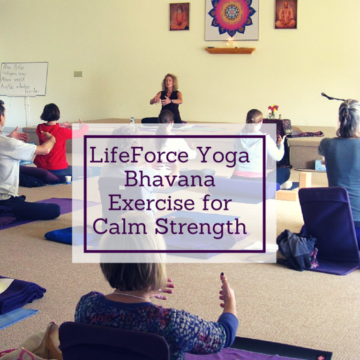
In Yoga, we call an image or vision that inspires us a “bhavana.” This guided bhavana exercise for calm strength, also uses pranayama yoga breathing and a mantra. You may wish to use it as a way to foster a sense of empowerment or to maintain steadiness through a difficult time.
We’ll be using a 4: 4: 6 breath, exhaling with a mantra. This means that you’ll be breathing in for four counts, pausing the breath for four counts if that’s comfortable for you, and then breathing out for six counts. You don’t need to count the beats of the exhalation, because we’ll be releasing the breath with the mantra “so hum,” which means “I am that.” In using the mantra “so hum,” you’re saying that on the deepest level, beneath all the obstructions—the chronic tension in your physical body, or feelings like fear and sadness in your emotional body, or the negative self-talk that might be going on in your mental body, there is no separation between you and that image for calm strength that you are holding in your heart. Beneath the blocks and obstructions, you already are that. The seeds for your wellbeing are already planted. We just need to choose to water those seeds, seeds like calm strength and peace and love, rather than the seeds of self-hatred and judgment.
Come into a comfortable seated position with your spine erect. Allow your eyes to close and begin noticing the breath as it moves in and out through the tip of your nostrils. No need to alter or change your breathing pattern. Just notice.
Now bring into your mind’s heart an image for calm strength. It may be an image from nature… or a face… or a symbol. If an image doesn’t readily appear, then just think the words “calm strength.”
Now see that image for calm strength or think the words. As you breathe in for four counts, you will be extending your arms out in front of your solar plexus, the manipura chakra, which is your seat of identity and self-esteem. Then sustain the breath for 4 counts, visualizing your image for calm strength or thinking the words. Next you will draw your hands to your solar plexus, one palm folded on top of the other, with the mantra “so hum.” We’ll repeat this three times, and then we’ll do the gesture and mantra one more time, drawing calm strength to the heart.
Find your comfortable and steady seat and allow your eyes to close. Inhale your arms out in front of your solar plexus. Hold the breath 2 – 3- 4, visualizing your image for calm strength.
- Exhale with Soooo Hummm
- Inhale 2-3-4
- Pause the breath, embracing your image
- Exhale Soooo Hummm
- Inhale 2-3-4
- Sustain the breath with your image for calm strength in your heart’s mind
- Exhale with Soooo Hummm
- Now, on this last round, draw your image for calm strength into your heart
- Inhale 2-3-4
- Pause the breath. I am that
- Sooo Hummm
When you complete, sit with your eyes closed with your image for calm strength, feeling the shift in your posture, your breath and your general wellbeing. Can you imagine when you might use this practice?
 I excerpted and revised this practice from my book Yoga Skills for Therapists, which is a manual of many mood-managing practices that don’t require a yoga mat. You can also find this practice guided on my CD LifeForce Yoga Bhavana – Say Yes to Yourself, a Guided Relaxation. Learn this practice and more from a LifeForce Yoga Practitioner.
I excerpted and revised this practice from my book Yoga Skills for Therapists, which is a manual of many mood-managing practices that don’t require a yoga mat. You can also find this practice guided on my CD LifeForce Yoga Bhavana – Say Yes to Yourself, a Guided Relaxation. Learn this practice and more from a LifeForce Yoga Practitioner.